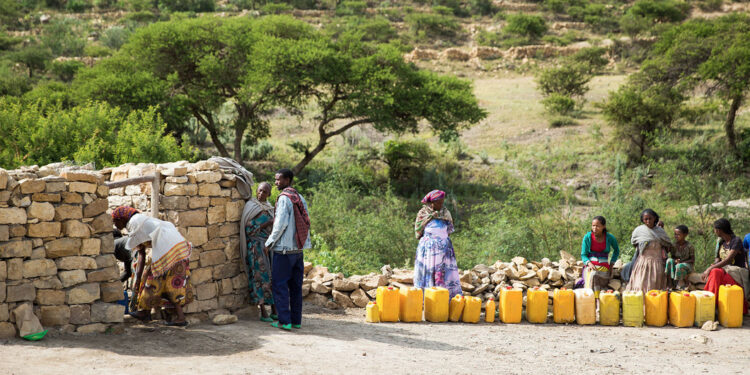The spectre of famine and starvation now looms even larger in Tigray in the wake of the Ethiopian government’s expulsion of seven individuals working for United Nations humanitarian agencies last week.
This tiff with the international humanitarian community certainly does not bode well for the dire situation of the people of the war-ravaged northern region, who have been suffering since tensions between the rebel Tigray People’s Liberation Front and the federal government exploded into violence in November last year.
There has been mounting concern about the food situation in Tigray as trucks transporting relief supplies appeared to be stuck in the region, unable to make the return journey to ferry more goods.
The UN was reported last week as saying that hundreds of aid trucks that had made the journey to Tigray from other parts of Ethiopia between mid-July and mid-September had not returned.
According to the UN, in the two months to September 16, some 466 trucks had entered Tigray through the Afar region, but only 38 had made the return journey. The whereabouts of the rest are unknown, with the two warring sides blaming each other for the crisis.
It is telling that the Ethiopian government’s September 30 announcement of the expulsions came just days after the UN chief of humanitarian relief warned that thousands of people in Tigray were likely experiencing famine and starvation because of what he termed a “de facto blockade”.
“This is man-made, this can be remedied by the act of government,” Martin Griffiths, UN Under-Secretary-General for Humanitarian Affairs and Emergency Relief Coordinator, was quoted by Reuters as saying during an interview.
Associated Press quoted him saying it was a “stain on our conscience” as children and others starve to death in Tigray.
The officials who were given 72 hours to leave Ethiopia include Adele Khodr, the Unicef representative, Sonny Onyegbula from the Office of the UN High Commissioner for Human Rights, and Kwesi Sansculotte and Saeed Mohamoud Hersi, both from the UN Office for the Coordination of Humanitarian Affairs (UN OCHA). The other three, all from UN OCHA, were Grant Leaity, Ghada Eltahir Mudawi, and Marcy Vigoda.
The letter from Ethiopia’s Ministry of Foreign Affairs termed them “persona non grata” and accused them of “meddling in the internal affairs of the country”.
The expulsions provoked mixed reactions. UN Secretary-General António Guterres expressed shock and said his organisation would continue to engage with the Ethiopian authorities “in the expectation that the concerned UN staff will be allowed to continue their important work”.
The US was blunt in its reaction. “The United States strongly condemns the Government of Ethiopia’s stated plans to expel seven United Nations officials and calls for an immediate reversal of this decision…. The expulsion is counterproductive to international efforts to keep civilians safe, and deliver lifesaving humanitarian assistance to the millions in dire need,” a statement from Secretary of State Antony Blinken’s office said.
It called attention to America’s imposition of economic sanctions against Ethiopia on September 17 and went on to urge the international community to pile pressure on the Ethiopian authorities “….and any other actors impeding humanitarian access… to allow and facilitate safe and unhindered humanitarian access to all in need”.
US President Joe Biden had explained that the sanctions were aimed at stopping the escalating war in northern Ethiopia and allow urgently needed humanitarian aid in the region.
Several embassies in Addis Ababa, including Germany, also called for the reversal of the expulsions.
Several Ethiopians who support their government’s actions went on Twitter to air their opinion. Some accused the UN of acting under the guise of humanitarian assistance to inflict damage on Amhara farmers and said its agencies should withdraw and stop the blockade on Wollo, Amhara.
Others lauded their government’s action as showing its determination to fight foreign intervention in their country. Yet others accused aid workers of fuelling conflict in Ethiopia.
The government of Ethiopia has several times accused international humanitarian groups of assisting the Tigray forces, claims that Griffiths has denied.
According to a UN report released on September 30, 2021, the humanitarian situation in Tigray remains dire, while the spillover of the conflict to neighbouring Amhara and Afar regions is rapidly increasing the humanitarian need.
The report added that the delivery of humanitarian supplies to the Tigray region remains heavily constrained due to conflict and insecurity.
In addition, access to medical supplies has been limited, the last supply of medicines being in July. It said health partners have not been able to rehabilitate and re-equip health facilities following systematic looting by parties to the conflict. The lack of essential medicines, vaccines, and diagnostic equipment, coupled with limited access to essential humanitarian assistance and services, and increasing numbers of children, women, and people with chronic diseases are at grave risk unless the restrictions placed on essential medical supplies are lifted immediately. Generators, ITC equipment, and office furniture have not been allowed to transit to Tigray.
The UN said at least 5.2 million people were targeted for emergency food assistance in Tigray.
Several experts speaking at a Human Rights Watch (HRW) panel discussion have urged Prime Minister Abiy Ahmed to end the blockade and ensure respect of human rights as Ethiopia prepares to form a new government.
Birgit Schwartz, HRW’s communication manager for Africa, expressed concern that access to humanitarian aid was still being limited despite the fact that the conflict in the Tigray region had subsided.
HRW Director Laetitia Bader said the humanitarian community in Ethiopia was also affected by restrictions on basic needs such as electricity, communication, and banking services.
She said her organisation had documented human rights and humanitarian violations that had led to massacres, sexual violence, and deliberate attacks against civilian objects and infrastructure by warring parties, including looting of medical equipment and medication in hospitals, especially in the town of Axum.
Carine Kaneza Natuyla, the Africa advocacy director, urged the African Union to intervene and initiate an African-led peace mediation strategy in Ethiopia.







